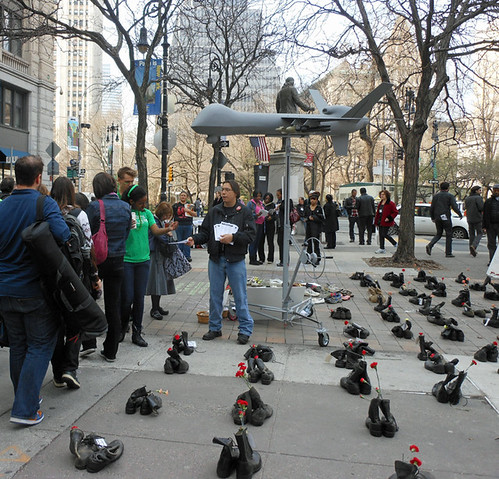
A hallmark of U.S. President Obama’s foreign policy has been a scaling down of troop presences in conflict areas, but without scaling down efforts in the War on Terror. Obama has pursued this as vigorously as his predecessor, but he has more strategically come to rely on Unmanned Aerial Vehicles (UAVs)–commonly referred to as drones–to target individual terrorists and terrorist camps.
From the beginning of this program, some groups have expressed concerns over the civil liberty implications of the use of UAVs. Privacy concerns, since UAVs are largely used in reconnaissance, were forefront in the minds of activists–until Anwar al-Awlaki.
Al-Awlaki was an American citizen of Yemeni descent and a radical Muslim cleric with ties to a series of terror attacks around the world, from September 11th to the Fort Hood shootings, so there was no question as to why the United States was pursuing him. The problem arose with how they finally caught up to him.
Both the Bush and Obama Administrations were remarkable in their disregard for the rights of detainees charged with acts of terror or sympathizing with terrorist organizations, often denying them their rights to a fair trial indefinitely. However, it was argued that since those detainees were not American citizens and were not held on American soil, they were therefore not privy to the rights protected by the Constitution. Many detainees remain in a legal limbo, classified as enemy combatants; however, al-Awlaki, as a citizen, was privy to the rights laid out in the Constitution. Or so most everyone thought. On September 30, 2011, he and his son were killed in a targeted drone missile attack, despite his family’s efforts to stop the attempt before he could be tried in court.
With such an unprecedented military strike against an American citizen, without an open and fair trial deliberating on his crimes, more Americans began to fear the implications of the program at home and abroad.
But are their worries well-founded? It is hard to say, primarily because of the secrecy UAV operations are shrouded in.
Occupy Wall Street activists claim they are being tracked, whether they were arrested at a protest or not, just for showing up at an OWS activity. A combination of overhead drones picking up cell-phone pings and GPS tracking software included in every Apple and Android phone is able to create a government database of everyone and anyone who ever went near an Occupy protest. Steven Rambam, a private investigator, told a gathering of hackers and peace activists at HOPE 9 in New York City, “I can tell you that everybody that attended an Occupy Wall Street protest, and didn’t turn their cell phone off–and sometimes even if they did–the identity of that cell phone has been logged, and everybody who was at that demonstration, whether they were arrested, not arrested, whether their photos were ID’d, whether an informant pointed them out, it’s known they were there anyway. […] Cell phones are now the little snitch in your pocket.”
The FBI is not usually in the habit of letting people know they are collecting files on them, but it is a practice reaching back to the J. Edgar Hoover years. Hacker group AntiSec said in early September it held proof that the FBI was actively monitoring every American with an iPhone, but the group did not say exactly how, nor have they yet released that proof. Whether this is a legitimate civil liberties concern, or a dystopian conspiracy theory, cannot be proven without more evidence from secret government files.
Activists are also concerned about the military aspects of UAVs, and in early October, anti-war activist group CodePink made headlines when they traveled to Pakistan to protest drones as killers of children. A group of over 30 Americans who are members of the Occupy partner organization took part in solidarity fasts and marches led by Pakistani opposition figure Imran Khan. During the marches, Pakistanis have cheered on their efforts, as well as signs they carried claiming the majority of casualties are innocent civilians and showing the over 160 children killed by drone strikes on civilian populations. They claim that public opinion in Pakistan is against drones because the population is terrorized by attacks (a version of the September 11th attacks every day, one tweet by an Occupy Wall Street account said).
But this protest may be an example of CodePink taking on “the white man’s burden.” Wikileaks files have shown that while Pakistani government officials speak out against drone attacks publicly, privately they are supportive. An editorial in English-language Pakistani newspaper Dawn argues that public opinion is against the drone strikes because it is seen as a too-secret and unaccountable violation of Pakistani sovereignty by American imperialism.
The root of the problem the public has with the use of UAVs appears to be the secrecy of the whole program. How is it decided who is targeted? What trial are they given? What information does the government collect? And what accountability is there when civilians are injured or killed? Occupy and its affiliates were successful in changing public dialogue about economic inequality, and it is possible, with a moderation of their claims, they could succeed in turning public opinion to wanting more openness in the U.S.’s policies and usage of drones.
Chrisella Sagers Herzog is the deputy editor for the Diplomatic Courier.
For further information on the topic, please view the following publications from our partners:
International Law and the Use of Drones
For more information on issues and events that shape our world please visit the ISN’s Security Watch and Editorial Plan.

